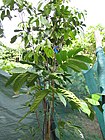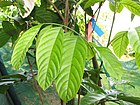Note: This is a project under development. The articles on this wiki are just being initiated and broadly incomplete. You can Help creating new pages.
Difference between revisions of "Lansium domesticum"
| Line 2: | Line 2: | ||
'''Lansium domesticum'''p is an evergreen tree usually growing 10 - 30 metres tall in the wild but generally only 5 - 10 metres in cultivation. The straight, cylindrical bole is irregularly fluted and has steep buttresses that can be 2 metres wide at the base; it can be unbranched for the majority of the tree's height and up to 75cm in diameter. | '''Lansium domesticum'''p is an evergreen tree usually growing 10 - 30 metres tall in the wild but generally only 5 - 10 metres in cultivation. The straight, cylindrical bole is irregularly fluted and has steep buttresses that can be 2 metres wide at the base; it can be unbranched for the majority of the tree's height and up to 75cm in diameter. | ||
==Uses== | ==Uses== | ||
| − | {{Uses|}}, {{Uses|}}, {{Uses|}}, {{Uses| | + | {{Uses|Diarrhoea}}, {{Uses|Intestinal spasms}}, {{Uses|Dysentery}}, {{Uses|Malaria}}.<ref name="Uses"/> |
==Parts Used== | ==Parts Used== | ||
Revision as of 18:31, 29 May 2020
Lansium domesticump is an evergreen tree usually growing 10 - 30 metres tall in the wild but generally only 5 - 10 metres in cultivation. The straight, cylindrical bole is irregularly fluted and has steep buttresses that can be 2 metres wide at the base; it can be unbranched for the majority of the tree's height and up to 75cm in diameter.
Contents
- 1 Uses
- 2 Parts Used
- 3 Chemical Composition
- 4 Common names
- 5 Properties
- 6 Habit
- 7 Identification
- 8 List of Ayurvedic medicine in which the herb is used
- 9 Where to get the saplings
- 10 Mode of Propagation
- 11 How to plant/cultivate
- 12 Commonly seen growing in areas
- 13 Photo Gallery
- 14 References
- 15 External Links
Uses
Diarrhoea, Intestinal spasms, Dysentery, Malaria.[1]
Parts Used
[[:Category:Herbs with used in medicine|]], stem, leaves, Root.
Chemical Composition
Common names
| Language | Common name |
|---|---|
| Kannada | |
| Hindi | |
| Malayalam | |
| Tamil | |
| Telugu | |
| Marathi | |
| Gujarathi | |
| Punjabi | |
| Kashmiri | |
| Sanskrit | |
| English |
Properties
Reference: Dravya - Substance, Rasa - Taste, Guna - Qualities, Veerya - Potency, Vipaka - Post-digesion effect, Karma - Pharmacological activity, Prabhava - Therepeutics.
Dravya
Rasa
Guna
Veerya
Vipaka
Karma
Prabhava
Habit
Identification
Leaf
| Kind | Shape | Feature |
|---|---|---|
Flower
| Type | Size | Color and composition | Stamen | More information |
|---|---|---|---|---|
| {{{5}}} |
Fruit
| Type | Size | Mass | Appearance | Seeds | More information |
|---|---|---|---|---|---|
Other features
List of Ayurvedic medicine in which the herb is used
Where to get the saplings
Mode of Propagation
[[:Category:Index of Plants which can be propagated by |]]
How to plant/cultivate
Langsat is an ultra-tropical plant. It is a tree of tropical lowland forest and even in its native range it cannot be grown at elevations above 650 - 750 metres.[4]
Commonly seen growing in areas
Rainforests, Humid river valleys, Rain forest, On limestone.
Photo Gallery
References
- ↑ Indian Medicinal Plants by C.P.Khare
- ↑ [Chemistry]
- ↑ [Morphology]
- ↑ Cultivation
External Links
- Ayurvedic Herbs known to be helpful to treat Diarrhoea
- Ayurvedic Herbs known to be helpful to treat Intestinal spasms
- Ayurvedic Herbs known to be helpful to treat Dysentery
- Ayurvedic Herbs known to be helpful to treat Malaria
- Herbs with used in medicine
- Herbs with stem used in medicine
- Herbs with leaves used in medicine
- Herbs with Root used in medicine
- Habit - Evergreen tree
- Index of Plants which can be propagated by
- Herbs that are commonly seen in the region of Rainforests
- Herbs that are commonly seen in the region of Humid river valleys
- Herbs that are commonly seen in the region of Rain forest
- Herbs that are commonly seen in the region of On limestone
- Herbs
- Pages without herbs images





